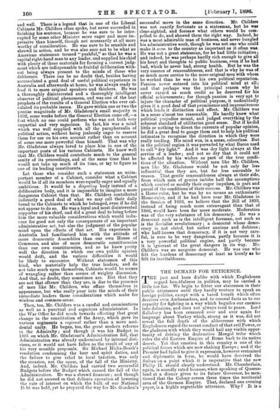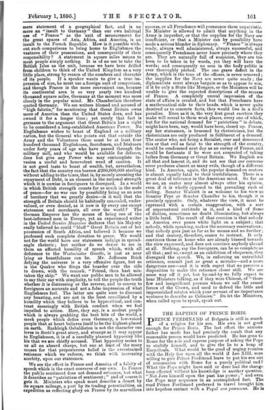THE DEMAND FOR RETICENCE. T HE just and keen dislike with
which Englishmen regard boastfulness in politics, may be carried a little too far. We begin to fetter our statesmen in their public utterances until they hardly venture to speak on foreign politics, except with a bated breath which often deceives even Ambassadors, and to conceal facts as to our capacity for fighting in a way which beguiles our enemies into delusions, and does not always tend to peace. Lord Salisbury has been censured over and over again for language about Turkey which, strong as it was, did not reveal the full depth of the abhorrence with which Englishmen regard the recent conduct of that evil Power, or the gladness with which they would hail any visible oppor- tunity of driving the destructive Mongol tribe which rules the old Eastern Empire of Rome back to its native desert. Yet that emotion in this country is one of the political forces which are now shaking Europe ; and if the Premier had failed to give it expression, however restrained and diplomatic in form, he would have deceived the Sultan on a, point which it is imperative that the new Philip II. should clearly understand. Mr. Chamberlain, again, is soundly rated because, when speaking of Queens- land at a dinner given to its future Governor, be men- tioned that the Colony covers three times the territorial area, of the German Empire. That, declared one evening paper, is a highly regrettable utterance. Why ? It is a mere statement of a geographical fact, and is no more an "insult to Germany " than our own habitual use of " France " as the unit of measurement for the great spaces of Asia. Africa, and America, is an insult to the French Republic. How is it possible with- out such comparisons to bring home to Englishmen the vastness of their possessions, and consequently of their responsibility ? A statement in square miles means to most people simply nothing. It is of no use to take the British Isles as the unit, because we have been drilled from children to think of the United Kingdom as a very little place, strong by reason of the numbers and character of its people. If a speaker wants to give a true im- pression of size, he must use a foreign unit of comp7rison, and though France is the more convenient one, because its continental area is so very nearly two hundred thousand square miles, Germany at the moment was more closely in the popular mind. Mr. Chamberlain therefore quoted Germany. We see writers blamed and accused of "high falutin," for mentioning that Great Britain owns more of America than the -United States does, and has owned it for a longer time ; yet surely that fact is germane to the argument that Great Britain has a right to be considered a long-established American Power. No Englishman wishes to boast of England as a military nation, but the General who points out that outside the Army and the Volunteers there must be at least four hundred thousand Englishmen, Scotchmen, and Irishmen under forty years of age who have passed through the military mill, and who would be available for defence, does but give any Power who may contemplate in- vaaion a useful and benevolent word of caution. It is not good taste to boast of wealth, but, nevertheless, the fact that the country can borrow £200,000,000 sterling without adding to the taxes, that is, by merely arresting the repayment of Debt, is an element in the national strength which it is unwise in foreigners to disregard. In a world in which British strength counts for so much in the scale of peace—for no war can by possibility bring us an acre of territory that we greatly desire—is it well that the strength of Britain should be habitually concealed, under- valued, or even denied, as it now is by every one except statesmen and merchants, all over the world ? The German Emperor has the means of being one of the best-informed men in Europe, yet an experienced writer in the United Service Magazine declares that his Majesty really believed he could " bluff " Great Britain out of her possession of South Africa, and believed it because we professed such complete devotion to peace. We would not for the world have our statesmen indulge in spread- eagle rhetoric ; but neither do we desire to see in them an affected humility of speech which, with all deference to the Westminster Gazette, is just as near lying as boastfulness can be. Mr. Jefferson Brick defying the universe is a very offensive figure, but so is the Quaker who flings the boarder over the side to drown, with the remark, "Friend, thou hast mis- taken thy ship." We want our public men to be allowed to say, their say with simplicity, to tell the people the truth whether it is distressing or the reverse, and to convey to foreigners an accurate and not a false impression of what Englishmen feel. The latter are quite sure to discount any boasting, and are not in the least conciliated by a humility which they believe to be hypocritical, and con- trast sneeringly with British conduct when we feel impelled to action. Here, they say, is a modest people which is always grabbing the best bits of the world, a meek people which defies even Germany, a low-voiced people that at heart believes itself to be the highest-placed on earth. Rashleigh Osbaldiston is not the character one loves in Scott's great story, and strange as it may appear to Englishmen, it is of a carefully planned hypocrisy like his that we are chiefly accused. That hypocrisy seems to us all an absurd charge, but one at least of the many causes for that preposterous belief is the overstrained reticence which we enforce, we think with increasing acerbity, upon our statesmen.
We see the effect in France and America of a falsity of 'speech which is the exact converse of our own. In France the public sentiment does not demand reticence, but what it describes as "patriotism of sentiment ; " and of course it ;eta it. Ministers who speak must describe a desert by its square mileage, a port by its trading potentialities, an expedition as reflecting glory on France by its marvellous success, or all Frenchmen will pronounce them unpatriotic. No Minister is allowed to admit that anything in the Army is imperfect, or that the supplies for the Navy are insufficient, or that a Minister can by possibility have made a serious blunder in diplomacy. " France" is always ready, always well administered, always successful, and consequently Frenchmen never know precisely where they are. They are naturally full of suspicion, they are too keen to be taken in by words, yet they will have the words; and consequently no sore in the body politic is ever thoroughly probed. The one grave defect in the Army, which is the tone of the officers, is never removed ; the supplies for the Navy are never quite ready ; the diplomatists must always bargain so as to appear to win, if it be only a State like Mongsin, or the Ministers will be unable to give the expected descriptions of the success of France. A completely unreal impression of the state of affairs is created, and but that Frenchmen have a mathematical side to their heads, which is never quite deceived as to concrete facts, they would live in a fool's paradise. Even as it is, the very first great exertion they make will reveal to them weak places, every one of which, but for the national demand for " patriotism" in debate, might have been, nay, would have been, closed up. France, say her statesmen, is bemused by rhetoricians, but the rhetoricians are only produced in fulfilment of a demand. The orator who, not being a Socialist, rose and denounced this or that evil as fatal to the strength of the country, would be condemned next day as an enemy of France, and would be fortunate if he were not suspected of taking bribes from Germany or Great Britain. We English see all that and lament it, and do not see that our converse error produces almost as many evils, though of a different kind. In America, again, the popular demand on orators is almost equally fatal to their truthfulness. There is a great deal of tolerance in the American mind. So far as we see, an orator may almost always utter his opinion, even if it is wholly opposed to the prevailing rush of feeling. Senator Walcott is as welcome to his view as Senator Frye or Senator Chandler to his, though it is precisely opposite. Only, whatever the view, it must be expressed with a certain exaggeration, with a sort of supernatural certitude in it, and a kind of flame of diction, sometimes no doubt illuminating, but always a little lurid. The result of that coercion is that nobody in America ever pours white light on a subject ; that nobody, while speaking, makes the necessary reservations ; that nobody goes just as far as he means and no further ; and that oratory, therefore, ceases to instruct. It only convinces those at home who are already biassed towards the view expressed, and does not convince anybody abroad at all. Nothing, say the foreigners, can be so complete as all that ; and so, except as an exhibition of eloquence, they disregard the speech. We, in enforcing an untruthful reticence, commit just as great a mistake—and a more dangerous one—and it is with regret that we perceive a disposition to make the reticence closer still. We are some way off it yet, but by-and-by we fully expect to hear Ministers talking, as if they were Chinese, of "those few and insignificant persons whom we call the armed forces of the Crown, and used to defend the little and impoverished estates which your servant of no importance ventures to describe as Colonies." Do let the Ministers, when called upon to speak, speak out.







































 Previous page
Previous page